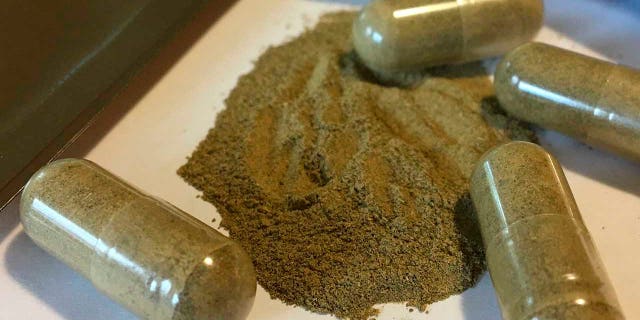Forum
Recent deaths reignite debate over regulating kratom
Kratom debate: Bans across the nation stir discussion of dangers and benefit
PHILADELPHIA – Laura Jones left the hospital after giving birth to her son using a walker. For weeks the 39-year-old would lay on her living room sofa too tired to move.
The first-time mother had suffered from endometriosis her entire adult life and had grown accustomed to the lower abdominal and back pain that accompanied her menstrual cycle. But this, Jones says, was different.
“My father had to carry me into the house because I couldn’t walk up the steps," Jones told Fox News.
FLORIDA, GEORGIA SEE FIRST VAPING-LINKED DEATHS AS NATIONAL TOLL HITS 12
Jones claims doctors had placed her on 11 different opioid medications to help treat her pain, which caused her to feel "like I was in a daze all the time.”
As weeks turned to months her energy levels continued to plummet, and her family's concerns grew. That’s when her sister suggested an herbal supplement called kratom.
Unfamiliar with kratom, Jones did her research and decided to end her current treatment plan and try out the supplement. That was five years ago, and Jones claims she has since led a more active and healthier lifestyle because of it.
“It’s not a cure,” she said. “I still have bad days, but it helps and I am less worried about the side effects.”

Laura Jones, 39, plays with her son, Jacob Jones, 5, at their Wilkes-Barre home. (Courtesy of Laura Jones)
Kratom, an herbal extract from the evergreen tree (Mitragyna speciosa) found in South Asia, is believed to act on opioid receptors in the brain. At a low dose, kratom acts as a stimulant, making users feel more energetic. At higher doses, users claim it reduces pain and may bring on euphoria. And at very high doses, it can act as a sedative.
But many in the medical community disagree with the use of the supplement.
The U.S. Food and Drug Administration (FDA) has not approved kratom and has warned that the active ingredient in the substance, mitragynine, may expose users to the risk of addiction, abuse, and dependence – and recommends the substance be classified as an opioid.
Despite claims that it can be used to treat opioid withdrawal symptoms, the FDA warns that there is no reliable evidence to support that theory.
In 2016, the U.S. Drug Enforcement Agency tried to reclassify kratom as a Schedule 1 drug; similar to heroin or marijuana, a step other nations have already taken. And in the U.S. several states — Alabama, Arkansas, Indiana, Rhode Island, Vermont, and Wisconsin — have banned it.

Sold in various capsules and powders, kratom has gained popularity in the U.S. as an alternative treatment for pain, anxiety and drug dependence. (AP Photo/Mary Esch, File)
Pennsylvania is one of several states grappling with how to regulate the substance. Neighboring Ohio is one of the latest states to move forward with regulations after the herbal product was listed as the primary cause of death for six Ohioans from 2016-17.
A government report released in April said kratom was a cause in 91 overdose deaths in 27 states. Officials previously said they knew of 44 nationally.
“The problem with kratom like many natural substances is users are never 100 percent sure what they are getting in the amount they are given,” said Dr. Richard Hamilton, a toxicologist in the Department of Emergency Medicine at Drexel University.
FLORIDA MAN WITH DOWN SYNDROME DIED IN HOT CAR AS CARETAKER SLEPT OFF KRATOM OVERDOSE: SHERIFF
Earlier this year, the herbal substance was linked to salmonella. And in April, the FDA released an analysis that found significant levels of lead and nickel concentrations, which exceeded safe exposure for oral drug intake.
“Based on these test results, the typical long-term kratom user could potentially develop heavy metal poisoning, which could include nervous system or kidney damage, anemia, high blood pressure, and/or increased risk of certain cancers," the FDA warned.
“I think most of us toxicologists, and physicians would like to see the sell of kratom end,” Hamilton said. “The benefits of the supplement are no greater than if you were in a therapeutic relationship with a prescriber in a position to help you with your pain."
In 2014, the American Kratom Association (AKA) was founded to protect nearly 5 million kratom users nationwide. The Virginia-based non-profit promotes the substance’s health benefits and actively lobbies to keep the product on shelves.
Mac Haddow, is among a large group of advocates or “Kratom Warriors” who have mobilized in several states and municipalities where legislators have proposed bans.
“The FDA is wrong on the science and they are wrong on the policy,” Haddow said. “The FDA ought to be listening to the life-saving stories we hear from veterans and those suffering from chronic illnesses.”

Andrew Turner, is a US Navy Veteran turned kratom activist. (Courtesy of Andrew Turner )
One of those stories is that of Andrew Turner, a U.S. Navy veteran-turned-kratom activist. Turner, now a Washington D.C. resident, served in the military for nearly 12 years was ultimately released early on medical retirement after withstanding a crippling arm injury. Along with his physical disabilities, Turner suffered from PTSD and a rare neurological movement disorder known as Meige Syndrome.
Meige Syndrome is characterized by involuntary and often forceful contractions of the muscles of the jaw and tongue. Doctors unable to cure the condition placed Turner on opioid pain relievers. After nearly 26 different prescriptions, Turner looked for other options.
“I’ve been taking kratom for nearly five years,” Turner told Fox News. “It’s not a cure but it helps calm me which ultimately helps relax my spasms.”
Turner, like many kratom users, takes the supplement daily in a tea form and purchases the herbal product online.
“I have found a way to safely use kratom, but that does not mean that kratom is ‘just’ safe,” he said.
Turner would like to see better oversight/regulation of the industry and is pushing for the Kratom Consumer Protection Act.
CLICK HERE TO GET THE FOX NEWS APP
The Kratom Consumer Protection Act is a piece of legislation that would allow consumers to be able to keep buying Kratom legally while also helping to ban the sale of dangerous and adulterated products.
“It’s fairly obvious the lack of oversight is what caused the salmonella outbreak. We warned about that a year prior and when it happened it was an, ‘I told you so’ moment no one really wanted to have,” Turner said.
But there are tragic cases associated with the supplement as well. In Florida, a man with Down syndrome died in a hot car after his caretaker ingested kratom, overdosed and fell asleep, authorities said.
Joshua Russell, 26, was arrested last week and charged with one count of aggravated manslaughter of a disabled adult in the May 9 death of John LaPointe in Seminole, Fla., the Pinellas County Sheriff’s Office said.
This case along with the 2018 death of Caleb Sturgis, 25, a Chester County man who died last June from an overdose after he drank tea made with kratom, according to the family-filed lawsuit against SoCal Herbal Remedies of Big Bear City, California.

Caleb Sturgis,25, dies of an overdose after using herbal kratom tea. (Fox 29 News )
Sturgis was driving to work on the Pennsylvania Turnpike in Chester County when his car struck a curb and flipped over. The Chester County coroner ruled his death was from “acute mitragynine intoxication,” the active ingredient in kratom. No other drugs were found in his system, save for the amount of caffeine contained in a cup of coffee. Sturgis had been taking the supplement for an energy boost, his family said.
HERBAL SUPPLEMENT KRATOM IS TIED TO MORE US DEATHS
In the lawsuit, the Sturgis family contends that SoCal Herbal Remedies failed to provide information on the risks of using kratom and did not attempt to test the product to make sure it was safe for use.
But for people like Jones, Pennsylvania’s decision to ban kratom would be life-altering.
“There aren’t many options for someone like me,” Jones said. “Now I walk with my son, go to yoga classes, and dance. My quality of life now is really incomparable.”
Early this spring, State Representative Scott Conklin, D-Rush Township, PA introduced a bill to classify kratom as a Schedule 1 controlled substance. During a news conference on the bill, he cited Pennsylvania's fourth-highest rate of overdose deaths in the U.S., and said it's “all the more reason steps should be taken now regarding kratom."
The legislation is still pending.
It's curious how kratom is considered just a supplement being that it stimulates the same opoid receptors. You would at the very least expect something like that to be regulated in how it can be produced, the same way as something like Tylenol, and at most require a doctors prescription. I know of a youtuber who was actually kicked out of her Rehab facility where she was recovering as a heroin addict and she got kicked out for bringing kratom on campus for her roommate, thinking it was allowed since cigarettes were and you can buy it easily at a smoke shop in Texas where she was. It was not allowed and the rehab said the reason was its just as bad for the receptors to be reactivated and would ultimately lead back to heroin anyways. So it's not surprising to me that these deaths are popping up in PA and Ohio, where they have been struggling the past few years with heroin and opoid abuse.
I think it could possibly be good for some people, but I do think it needs to be better regulated so people aren't taking too much and that people aren't taking it for fun.
I think Kratom should be more regulated, it is able to be sold in almost all gas stations and vape stores. It is very easily accessible. I think this is especially dangerous because those struggling to recover from addiction may be looking for an alternative but Kratom could become a new addiction because it stimulates the same receptors in the brain as opiates do.
@tabethapetersoniectskin-com I agree, I think this is something that should be way more regulated. It is just as accessible as Tylenol and other over the counter medications. I think it is crazy that something advertised to help someone off opiates could actually provoke you to fall right back into and habits with actual drugs.
I think it's something that needs to be regulated, I do not think anyone can walk into the store and buy it. I do believe that it helps with some of the things listed. It should be offered by a physician.
@karyssamarleriectskin-com I agree its basically an alternative for an opioid when it can be acessed like that.
@mikaylaalleniectskin-com Agreed its not something that should just be used as a party drug or something. It needs to be used for what it is intended for.
Kratom seems like another scary option for those with addiction. I think it should be regulated, but physicians aren't always quick to offer herbal remedies. I'm not sure that it needs to be offered in store or by a physician.
I think that Kratom is something that needs to be studied more and regulated to make sure that people are ingesting the proper things and its not laced or too high or dosages or is actually safe. I think anything can become addictive it just matters how you handle it and if you have an addictive personality type style.
@alexisdozieriectskin-com Yes, regulated so that people who need it can be safe and receive treatment but it shouldn't be unobtainable like most things that are supposed to help people are.
@tabethapetersoniectskin-com I feel that its is just an alternative, yes it can help some people but it can also make matters worse especially when people say that they use it to wean off of other drugs but its just a replacement.
@karyssamarleriectskin-com Great point! If its able to reach the same brain receptors as opioids, then maybe it shouldn't be easily accessible.
@melissalandersiectskin-com Very true about some physicians. Wonder how often it is suggested or given by herbalists/homeopathic doctors.
All herbal supplements pose a risk, as does all prescription medications. It would make sense to make this herbal supplement more regulated since it can cause the brain to respond to it the same way as opioids.
Since this supplement triggers the same receptors as opioids, I think I should be more regulated. I do think there are patients that would benefit from the supplement but ensuring a supplement is not missed is very important.
@rebeccamatuskaiectskin-com I agree everything, medications and supplements, pose a risk.
@elianaaltamiranoiectskin-com I agree, we definitely need more information to understand all of its effects.
@elianaaltamiranoiectskin-com I agree I think it does need to be studied more and sold as a doctors prescription
I know someone who overdosed one it and was throwing up and seeing things that weren't their I think it needs to be studied more and for doctors to prescribe it because it can also be known as a synthetic heroin which needs to be studied more and needs to be more healthy
@rebeccamatuskaiectskin-com I agree 100%. Although I have my problems with big pharma, they are there for a reason. Whether its karatom, CBD, TCH, or what have you, it needs to be regulated. I know that's just an easy blanket statement but it really goes so much further than that. I'll explain with a brief little backstory.
In 2021 I got really into learning about cannabis because I had a loved one in my life who was suffering from parkinson's. I saw her take some THC and how it immediately helped her not shake so much. I did a little googling and found that there was a cannabis conference in Richmond being held a couple of months later and I decided to go to learn more about it since she couldn't travel.(we are getting to the karatom part I promise).
One of the speakers was a woman who had her PHD and she was a toxicology expert. She would get calls from the hospital about people who had taken some gas station CBD gummy and end up having wild symptoms and end up in the hospital. She then took the rest of the sample and ran it in her lab to discover the makeup of said products. What she discovered every single time was that these companies (because they were not regulated) would add all kinds of filler substances to their products. They would then slap on these B.S. QR codes that you could scan and would say that they were lab tested and contained all of these different things that were just not true. She researched said labs, and more than half of them did not exist and the rest just straight up lied! Every single sample she tested had synthetic chemicals and compounds in them (she tested thousands). She was so horrified by her studies that she devoted her life's work to informing the public about substances like these.
I remember at the conference she also touched on karatom because it was yet another popular gas station substance. These companies can get away with things like this because they have no red tape. They are not FDA approved and its at the users risk. They sell it for so cheap because its quite literally a synthetic drug that they are green washing as a natural substance. If it truly was so natural it wouldn't be so cheap. Why? because most, if not all ,are growing these plants so rapidly with all sorts of pesticides and synthetic nutrients that have God knows what in it. They are trying to produce as much as humanly possible in the shortest amount of time so they take whatever short cut they can in order to make a profit. So not only do you not know what chemicals where dumped into this plant during its entire lifecycle, but you also have no clue what fillers they are putting into these capsules, tinctures and powders. They don't have to disclose that because they are not regulated. Another problem with karatom not being regulated is that a company could say that this one pill is 500mg or whatever, but its actually not! There is no control of how strong of a dosage you are taking, because it hasn't gone through the proper checks and balances of lab testing and analyzing. It'd be like just taking whatever unmarked pill a stranger would offer you and just rolling with the punches. That's the exact risk you are taking when you ingest these mystery kind of karatom cocktails. You have no idea what's actually in it or how strong it is.
I'm all for natural remedies HOWEVER, always get something from a medical state regulated dispensary. If it's not there don't touch it. Im gonna get off my soap box now 🙂

 By
By 

